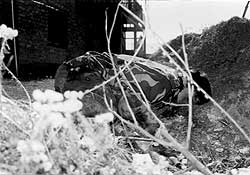 From the distant war against terror, Nepal's state of emergency seemed somehow unreal. Through the Afghan dust and the haze of propaganda, a crisis in the Himalayan kingdom was difficult to imagine. I reminded puzzled colleagues of last June's massacre. They usually nodded, and wondered how a place with such a placid reputation was having such a bad year. Then they turned back to Afghanistan, Osama and the Americans and forgot that Nepal even existed. Not me. I came back home, as a journalist but also as a resident and family man.
From the distant war against terror, Nepal's state of emergency seemed somehow unreal. Through the Afghan dust and the haze of propaganda, a crisis in the Himalayan kingdom was difficult to imagine. I reminded puzzled colleagues of last June's massacre. They usually nodded, and wondered how a place with such a placid reputation was having such a bad year. Then they turned back to Afghanistan, Osama and the Americans and forgot that Nepal even existed. Not me. I came back home, as a journalist but also as a resident and family man. As my plane touched down, the mobile started ringing. A Coca Cola bottling plant had been bombed. Could I get over there and start doing my duty? My editor's remonstrations overrode my own desire to see the family and I complied meekly. That was Thursday. On Friday, I arranged a visit to Salleri, the district headquarters of Solukhumbu. The carnage there at the beginning of the week was the drawing card, not the presence of Everest or the Sherpas' fabled mountaineering skills.
We flew east from Kathmandu, joking with each other about sitting on bullet-proof jackets to protect our posteriors from Maoist gunfire. What is it about risk that lowers our threshold of humour so low? It was a clear and splendid day. The Sagarmatha massif soon loomed and we dropped down into Salleri. As you approach the village, halfway up a towering ridge, the helicopter flies first due north then makes a tight U-turn by Phaplu airport.
"There," said Captain Dhakal, pointing up at the landing strip, "You can see the ruins of the control tower. Blown up by Maoists." When the chopper levelled off and started to mush gently down to the ground, the usual crowd of policemen and local officials was supplemented by soldiers carrying heavy machine guns and M-16s. "Commandos," muttered a friend. A strange bundle, wrapped in white cloth, lay on a lonely table by the helicopter. We gave it no more than a brief glance.
A group of men wandered over and said they wanted to use the aircraft for an emergency medical evacuation. Not a casualty from Maoist fighting, but a local man who was haemorrhaging-probably stomach cancer, according to a health worker. Feel free, we said. One of the party that had greeted us, the Assistant Chief Development Officer, gestured at the bundle on the table. "We'll be taking that back too," he said. Then he explained what \'that' was.
When the Maoists attacked Salleri late at night on the 23rd of November, they stormed two places simultaneously. At one end of the village, the army fought back fiercely. At the other, government buildings and workers fell victim to the onslaught. In the white-wrapped bundle was the body of the land revenue official who'd been taken off into the night by Maoists. "We found him this morning down there," said the Assistant CDO, gesturing back towards the bottom of the valley. "His arms and legs had been slashed off with
a khukuri." His face was grim, and our expressions hardened immediately.
We walked around the town and took measure of peoples' fear. By midday, a warm winter sun shone down. Families sat outside, soaking up warmth for the long cold night ahead. They smiled and teased each other.
But they told tales of horror. Sixty-year-old Lok Maya Shreshta showed us her ruined home, blown up because it was next to the District Administration Office. "I told the Maoists, as God is my witness, kill me, because you've destroyed everything I own." She wiped away a tear as she spoke, the fruits of a lifetime's labour lost.
Down a grassy slope from the bazar, two young girls were staring into a small ravine. At the bottom, dogs gnawed a camouflage-clad corpse. The girls said the body was a Maoist fighter and showed me pipe bombs and medical supplies strewn nearby. "It was a base," they said, for the attack. Other bodies lay in clumps of grass. The gunfire was between Maoists trying to recover slain comrades and vigilant soldiers.On the way back, shuddering through now-hazy skies, we chanced upon a worrisome sight. Just at the edge of Ramechhap district, a massive public meeting was taking place. As the helicopter circled overhead, the pilot pointed to people running towards the jungle. "Maoists," he said, and yanked up on the controls to gain height. "Can't have them shooting at us," he said. This time, there were no jokes about bullets in the behind.



